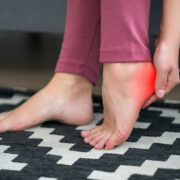How to Diagnose & Treat Achilles Tendon Injury
Keeping active is important as you age. However, activity can also lead to injury. Even the most careful athletes can suffer from tendon injuries, and injuries to the foot or ankle is no exception. The Achilles tendon, also called the calcaneal tendon, is especially vulnerable to injury in middle aged athletes, so it’s important to identify and treat injuries as soon as possible to prevent further injury.
What Causes Tendonitis?
Achilles tendon pain is frequently caused by intense physical activity, including running. Frequent stops and starts, as well as pushing off motions, such as when one is running or training for intense sports, can lead to tendon injuries and affect the athlete’s performance if the Achilles tendon is put under too much stress.
Types of Achilles Tendonitis
There are two types of Achilles tendon injuries which, if left untreated, can lead to further problems. The two types of injuries are:
- Achilles Tendonitis – Typically a short-term problem if treated, Achilles tendonitis is inflammation of the tendon that indicates overuse of the tendon. Runners who increase the duration or intensity of their work outs may experience tendonitis. Under doctor’s supervision, tendonitis can often be treated at home.
- Achilles Tendonosis – If left untreated, Achilles tendonitis can result in microscopic tears in the tendon, which breaks down the structure of the tendon and leads to degeneration. In some cases, chronic tendon degeneration may lead to a ruptured tendon and require surgery.
In both types of injuries, achilles tendon pain, tenderness, and swelling may occur. When degeneration of the tendon begins to occur, nodules may appear along any part of the damaged tendon.
Diagnosis and Treatment of Tendon Injuries
When a patient comes to a foot specialist with tendon pain, the specialist can examine the patient’s foot, which may include rotating the ankle and checking the range of motion. X-rays and other imaging technology can be used to determine the extent of the injury as well as lead the doctor towards a treatment plan that works for the individual patient.
Some common Achilles tendonitis treatment options include:
- Immobilization – Using a cast or walking boot, the patient may find that immobilizing their foot and ankle allows the tendon to heal. A walking boot also reduces the force on the tendon, thus reducing injury.
- Ice – A tendon injury often results in swelling, and to reduce inflammation, a doctor may prescribe using ice on the affected area to reduce the swelling. However, applying ice directly to the skin is not recommended. Instead, patients should use a thin towel as a barrier to the bag of ice and keep the ice on the area for 20 minute increments.
- Pain and inflammation reducing oral medications – Ibuprofen and other nonsteroidal anti-inflammatory drugs (NSAIDs) may help reduce pain and inflammation that results from Achilles tendon injuries.
- Foot orthotics – If over-pronation or an abnormal gait is affecting the injured tendon, the doctor may prescribe custom orthotics to reduce continued injury to the tendon.
- Night splints – Patients often experience pain from injured Achilles tendons at night. Wearing night splints may allow the patient to stretch the tendon during sleep, which helps the injured tendon.
- Physical therapy – An Achilles tendon injury may improve with strengthening exercises, massage, running/gait re-education, and stretching, among other types of therapy.
Patients who do not have success with non-surgical methods of Achilles tendon injury treatment or who experience further degeneration of the tendon may require surgery.
Schedule Your Appointment Today
If you have Achilles tendon pain or would like to discuss other foot or ankle problems, contact Missouri Foot and Ankle today. We have three convenient St. Louis area locations to suit your needs and your schedule.





